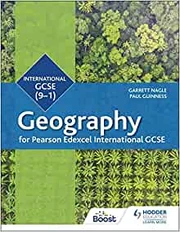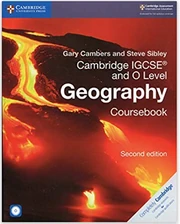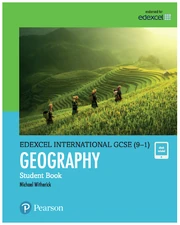Geography is one of the subjects that private candidates usually have to take as International GCSE. This is because of fieldwork requirements and is explained below. Read on for information on the specifications and advice on how to carry out fieldwork.
There were changes to the way GCSE Geography and Edexcel IGCSE Geography were assessed in 2022 due to the Covid pandemic. This temporarily made it much easier to do GCSE Geography as the fieldwork requirement was waived. It also means exam papers for Summer 2022 will be different to normal for those looking at past papers. Edexcel IGCSE had a reduction of content so fewer questions needed to be answered and only 'unknown' fieldwork was tested. Exams will be back to full specification in 2023.
Can I do GCSE Geography?[]
GCSE Geography is theoretically available to external candidates, but all GCSE Geography specifications have field work requirements which have to be authenticated by the exam centre. In practice this very difficult to arrange. None of the main commercial exam centres are known to accommodate GCSE Geography.
From AQA:
Fieldwork is an essential aspect of geography. It ensures that students are given the opportunity to consolidate and extend their geographical understanding by relating learning to real experiences of the world.
Schools and colleges must submit a written statement as evidence that the fieldwork requirement has been met.
The statement must record the date, location, numbers of students participating, the main issues/questions investigated and the part of the specification content to which the fieldwork is linked. The statement must be signed by the Head of Centre.
Any failure to provide this statement in a timely manner will be treated as malpractice or maladministration (under Ofqual's General Condition A8 (Malpractice and maladministration)).
Home educators usually take International GCSE (IGCSE) Geography, which is written exams only. Fieldwork is still part of the specification, the exam will include questions on how it could be carried out, but it does not need to be signed off by the exam centre.
Options for Geography[]
Cambridge International GCSE Geography
Cambridge offer 2 IGCSEs in Geography from 2018. The difference is in the grading, 0976 being 9-1 and 0460 being A*-G, otherwise the syllabus is identical.
CAIE International GCSE Geography (0976) page and specification
CAIE International GCSE Geography (0460) page and specification
0976 was new in 2018. 0460 the specification was updated for 2018 exams.
- Exams from: 2018
- Available in Autumn and Summer series
- Specification code: 0976 (9-1) or 0460 (A*- G)
Subject Content[]
The syllabus is divided into three themes:
- Theme 1: Population and settlement
- Theme 2: The natural environment
- Theme 3: Economic development.
Candidates are required to study a range of case studies outlined in the specification.
Assessment[]
100% exam based option.
- Paper 1 - Geographical Themes - 1hr 45 mins - 75 marks - 45%
- The paper is in 3 sections. Candidates answer one multi-part question from a choice of two in each section.
- An insert of resources (photos, maps, graphs etc) will be provided.
- Candidates should refer to suitable case studies to illustrate the individual themes.
- Paper 2 - Geographical Skills - 1hr 30 minutes - 60 marks - 27.5%
- Candidates answer all questions.
- An insert of resources (photos, maps, graphs etc) will be provided.
- Mapwork questions are asked and candidates are provided with an A3 map to use.
- Paper 4 - Alternative to Coursework - 1hr 30 minutes - 60 marks - 27.5%
- Candidates answer two compulsory questions
- An insert of resources (photos, maps, graphs etc) will be provided.
- Questions relate to Geographical enquiry/fieldwork
There is also a coursework option where students sit papers 1 and 2, but complete coursework (listed in spec as component 3) instead of paper 4. This is an option than is not available to private candidates.
Resources[]
There are several different textbooks, workbooks and revision books available for this specification - a list can be found here
Past papers can be found on the specification pages or sites such as pastpapers.co and papacambridge. Each series of 0460 (besides the March series - which is only sat in India) has 3 sets of papers available. These are because they were sat in different time zones. They are the same syllabus and useful for practice. You can use both 0976 and 0460 papers to practice.
The maps are not always provided on the CAIE due to copyright, you could ask your centre. They are often available from the likes of Papacambridge though. The maps are A3 format, so you can easily get them printed off at a local copy shop/anyone with an A3 printer. DO REMEMBER to set the scale to 100% (or ask the printer to print at 100% scale) otherwise you won't be able to do the cross section and grid ref questions accurately.
Geography Pods - tailored to the CIE IGCSE syllabus. Has LOADS of activities, videos etc, like a free online course. The downside is that the web design takes some getting used to as the menus are hard to navigate.
Seneca covers CAIE Geography
The Geography Academy - Youtube playlist for CAIE IGCSE
Geography Revision - notes and powerpoints, mapped to CAIE. Subscriber site.
Units of work for some topics from This is Geography
Free resources from Internet Geography - there are more resources for subscribers.
The Geographer Online - free resources
Essential Mapwork Skills - an old book but useful for paper 2.
Scroll down for more non spec specific resources
Edexcel International GCSE Geography[]
Edexcel International GCSE Geography page and specification
- Exams from: June 2019
- Available in June and November (from 2023)
- Specification code: 4GE1
Subject content[]
The Pearson Edexcel International GCSE in Geography is split into 2 components, Physical Geography and Human Geography, there is some optionality to the topics studied.
- Component 1: Physical Geography
- Candidates choose two out of three topics from: river environments, coastal environments, hazardous environments.
- For each topic they need to cover two case studies one from a developed and one from a developing or emerging country. Candidates are required to use the case studies as supporting examples when answering longer mark questions.
- Candidates are required to complete one geographical enquiry involving fieldwork relating to one topic from: river environments, coastal environments, hazardous environments.
- Candidates choose two out of three topics from: river environments, coastal environments, hazardous environments.
- Component 2: Human Geography
- Candidates choose two out of three topics from: economic activity and energy, rural environments and urban environments.
- For each topic they need to cover two case studies one from a developed and one from a developing or emerging country. Candidates are required to use the case studies as supporting examples when answering longer mark questions.
- Candidates are required to complete one geographical enquiry involving fieldwork relating to one topic from: economic activity and energy, rural environments and urban environments.
- Global issues. Candidates choose one topic from: fragile environments and climate change, globalisation and migration, and development and human welfare.
- Candidates choose two out of three topics from: economic activity and energy, rural environments and urban environments.
Assessment[]
100% exam based.
- Paper 1 - Physical Geography - 1hr 10 mins - 70 marks - 40%
- Section A: Candidates choose two out of three questions on: river environments, coastal environments, hazardous environments.
- Section B: Candidates choose one out of three fieldwork-related questions on: river environments, coastal environments, hazardous environments. Questions ask about familiar and unfamiliar fieldwork contexts.
- Paper 2 - Human Geography - 1hr 45 mins - 105 marks - 60%
- Section A: Candidates choose two out of three questions on: economic activity and energy, rural environments and urban environments
- Section B: Candidates choose one out of three fieldwork-related questions on: economic activity and energy, rural environments and urban environments. Questions ask about familiar and unfamiliar fieldwork contexts.
- Section C: Candidates choose one out of three questions on: fragile environments and climate change, globalisation and migration, development and human welfare.
Resources[]
Pearson publish a textbook and an online teachers guide for the specification. Details can be found here
Answers can be found here

Hodder have published a new textbook (available from 2 June 2023) - details and a preview here.
Answers for the Hodder textbook are coming soon (quote from an email in Oct 2023): "I can confirm that the publishers are currently working on the answer resource and will be uploaded to the below link in due course: https://www.hoddereducation.co.uk/geography-international-gcse-answers"
Hodder My Revision Notes: Edexcel International GCSE Geography
Geography Skills and Fieldwork - written for GCSE but a number of home educators have used for the IGCSE and found useful.
The teaching and learning section on the specimen page has a useful getting started guide and exemplar answers to help with exam prep, Plus schemes of work and a fieldwork guide to help with covering the content.
Past papers can be accessed through the specification page or here. Papers with an R suffix were available in a different time zone. They are the same specification and can be used as practice. There were changes to the way Edexcel IGCSE Geography was assessed in 2021 and 2022 because of Covid, so papers from these years will be different. Read the details under 2021 or 2022 support on the teaching and resources section on the specification page.
Revision notes, and topic questions from Save my Exams
Units of work for some topics from This is Geography
Scroll down for more non spec specific resources
How do you do Fieldwork?[]
Comments from a Geography teacher: updated August 2022
The Edexcel syllabus includes compulsory fieldwork investigations in both papers. In paper 1, physical geography, you would choose to answer one question from a choice of three physical fieldwork investigations (either river environments, coastal environments or hazardous environments). In paper 2, human geography, you would choose to answer one question from a choice of three human/economic fieldwork investigations (economic activity and energy, rural environments or urban environments). Students will need to refer to fieldwork they have undertaken themselves for part of each question, plus answer further questions on unseen fieldwork scenarios. (NB this was modified for 2021 and 2022 to allow for the impact of Covid, but the requirement for actual fieldwork experience will return from 2023).
It is really important to look at the style of questions from past papers to understand what is expected, there are only a limited number of questions that can be asked and there is no reason why students can't practice a model answer to the "usual" questions - eg How did you ensure your data collection was accurate and reliable? There is complete flexibility to choose your own investigations, within the scope of the topic, so you can keep your investigation simple and straightforward with minimal equipment. Methods of presenting data and justification of appropriate graphs are key skills, as well as the methods of data collection and equipment required. For investigation ideas, see below.
For CAIE, fieldwork is examined in paper 4. Students answer 2 compulsory multi-part questions, one on a physical topic and one on a human/economic topic. The questions are always on unseen material and often include fieldwork scenarios students would be very unlikely to have undertaken (such as how the ecology in a tropical rainforest changes) - the point is that if a student really understands the fieldwork investigation model, they can apply it to any investigation. In reality, there is a limited range of equipment students are expected to know how to use so it is important to know what you would use to measure various attributes. Otherwise doing lots and lots of past papers is invaluable and wherever possible experiencing some actual fieldwork always highlights the shortcomings and how a future investigation might be improved. There is no requirement to have undertaken your own fieldwork, however it is highly advisable to have a go at a couple of simple investigations to experience the different steps.
Simple investigations that require little equipment could be:
- Traffic survey - count the number of vehicles that pass in a 5 minute period, note whether car/van/bus/bike etc. Repeat at different times of day/days of week.
- Pedestrian flow count - count the number of people passing a specific spot for a 5 minute period. Repeat different times of day/days of week. Ideally have several groups counting at the same time in different locations.
- Environmental quality survey - assessing things like street cleanliness, parking, building condition, noise levels (free decibel meter on phone) as you move from town centre to edge of town.
- Measuring width and depth of small stream as it travels downstream
- Measuring water pollution along a stream (measure water pH, clarity, sample and count invertebrates).
- Beach - measuring change in size and shape of pebbles up/down the beach or left/right of beach, look for evidence of longshore drift if there are groynes (how much sand/shingle built up each side of groyne).
- Questionnaire - people's views on renewable v non-renewable power sources;
- Using field guides to survey and biodiversity (plant/animal/insect) in hedgerow, woodland, farmed field, grassland etc
Comments from other members of the group:[]
Aug 22 - "We did Cambridge IGCSE 4 years ago with no tutors/courses, just myself and my 15 and 12 year olds. We did most of our practical fieldwork on populations and rivers. For populations we studied land use in two different sized locations (a village and a small town) and did a survey of people in the town to see why they were visiting and how far they had travelled from. We also did traffic and pedestrian counts. For rivers we measured flow rate and cross-sectional area at different places along the same river. We also took measurements at one point in a local river every day for two weeks and recorded how that related to the amount of rainfall in the area (we made our own rain gauge). In each case we started with a question that we were investigating, worked out how we were going to investigate, what measurements to take or questions to ask in the survey etc in advance. We recorded data while we were in the field using everyday measuring instruments/surveys/maps, and also did field sketches and took photographs. Afterwards we used the data we had collected to make appropriate charts, graphs etc and collated all our work into powerpoints. Other fieldwork we covered theoretically, looking at what fieldwork could be done in different topics as we went through them. Seemed to work as she got an A*!!"
Royal Geographical Society - Fieldwork resources
The Geographical Association - Fieldwork resources
The Field Studies Council's Outdoor Classroom programme offers group fieldwork trips to educational groups, often as a day trip but sometimes over a longer period.
Geography Skills and Fieldwork - written for GCSE but a number of home educators have used for the IGCSE and found useful.
Useful blog with fieldwork advice - Blog About Britain
River Darent Virtual Fieldwork by David Rayner: very useful example fieldwork project. Hard to navigate, but if you go to the bottom left and click on 'Fieldwork techniques and equipment', you'll see a useful page. There is more - but again, navigation is not intuitive. Fieldwork techniques and Equipment. At the end of this page , click on 'Forward' at the bottom of the page. This takes you to more fieldwork techniques. Measuring the size and angularity of stones in the riverbed looks like the sort of thing kids would enjoy as they could get soaked, muddy, and probably throw stones too.
Virtual Fieldwork by David Rayner - coastal erosion at Reculver, and sand dunes in North Wales. Online fieldwork projects that you can use as models for your own, or do your own project using photos and data from these locations. For each topic, click on the 'Virtual Fieldwork Tour' button and make sure you explore all parts of the site as lots of gems are hidden away. Very old website so bit clunky to use.
General Resources[]
Field Studies Council have said that they are keen to work with home educators. More details of their Fieldwork Study Days here. They also have lots of useful resources.
The Geographical Association Teaching Resources
The Royal Geographic Society Teaching Resources
Ordnance Survey has a great educational section with free stuff on map reading skills
Teachit Geography - some subscriber but lots free
Futurelearn often has courses that can help bring case studies to life.
BBC Bitesize - GCSE focus but pick out the topics
Oak Academy - for GCSE but topics may be useful
BBC Teach - videos for GCSE Geography
Time for Geography - useful videos
Pumpkin Interactive - Streaming library, subscriber but offers a free trial
Planet Lacey - Youtube channel for Geography revision
Earth Story DVD of documentary series about physical geography - really great.



